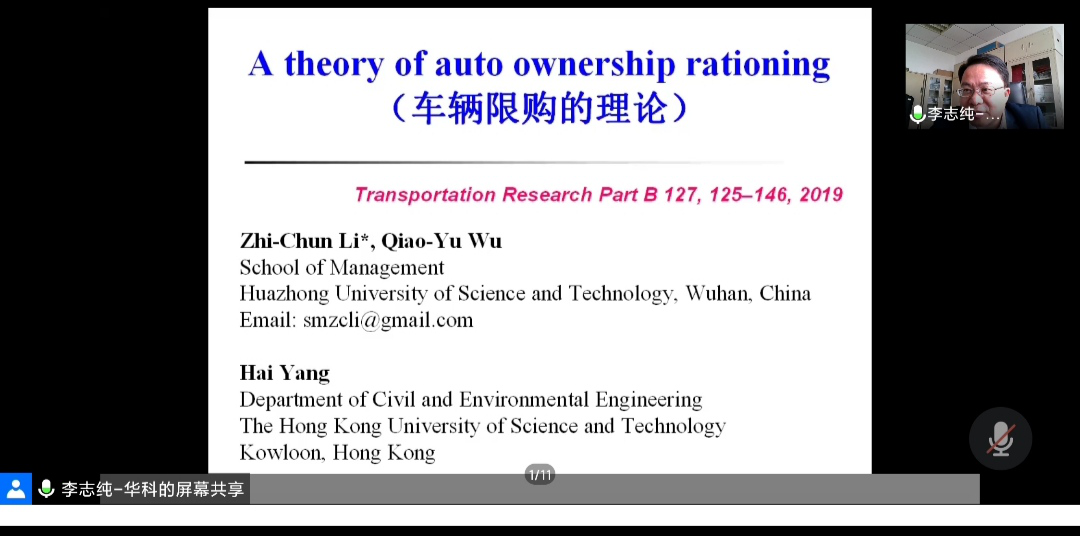At 10:00 am on April 27th, the second phase of the "Engineering Management Forum" series of lectures of School of Economics and Management of Beihang University was successfully held on the Tencent conference platform. In this lecture, Professor Zhi-Chun Li , a doctoral supervisor a professor at the School of Management of Huazhong University of Science and Technology, gave us a detailed description of the theory of vehicle purchase restriction, including auction, lottery, and hybrid scheme.

Professor Zhi-Chun Li is the Changjiang Scholars Distinguished Professor of the Ministry of Education.He has presided over a number of scientific research projects, such as the National Outstanding Youth Social Science Fund, the New Century Excellent Talents Project of the Ministry of Education, the National Hundred Excellent Talents Fund, and the Huo Yingdong Fund for Young Teachers. He is currently deputy editor of the SCI/SSCI Journal “Transport Policy” 、 “Transportmetrica B”and“Journal of Advanced Transportation”, and an editorial board member of “Transportation Research Part E” and “International Journal of Sustainable Transportation”.
Professor Zhi-Chun Li provides a theoretical analysis of three alternative auto ownership rationing schemes, including lottery, auction and the hybrid scheme. The city’s residents are differ- entiated by their income level, which is assumed to follow a uniform distribution. Expected social cost minimization models are proposed for determining the optimal auto quota for these schemes and the optimal proportion allocated to the lottery and auction in the hybrid scheme. The solution properties of the proposed models are analytically explored, and a comparison of these schemes is made.
The results show that the auction scheme is most efficient and the lottery scheme is most inefficient in terms of the expected social cost. The optimal auto quota increases with degraded transit services, but decreases with increased auto travel time. Increasing the proportion of allocation to the lottery in the hybrid scheme may lead to an increased or a decreased optimal auto quota, depending on the road service level. Resident’s income gap can significantly affect the optimal quota solution:widening the income gap via raising the income of the rich pushes the government to increase the quota to be provided. However, narrowing the income gap via raising the minimum salary standard may require an increased or a decreased quota provision. The efficiencies of the lottery and auction schemes are very close in terms of the expected social cost, which justifies the use of the lottery scheme in practice.
Finally, Professor Zhi-Chun Li suggested some future research. It was assumed in this report that the auction and lottery were sequentially implemented in the hybrid scheme. Although this is the case of Guangzhou China, it is meaningful to examine the impacts of implementation sequences of the auction and lottery in the hybrid scheme, which is left for future study.This report only discussed the auto ownership restriction policy. An integration of such a policy with other policies (e.g., vehicle usage restriction based on odd- and even-numbered license plates and congestion tolling) may be able to gain an improved efficiency in alleviating traffic congestion, which deserves a further study. In reality, socio-economic and demographic factors (e.g., income growth, urban expansion, population growth) may dynamically change over time and space. There is thus a need to design a dynamic vehicle quota system to capture the dynamics of a city system in a future study.
Professor Zhi-Chun Li’s report with clear logic and simple explanations benefited everyone. During the meeting, teachers and students had in-depth discussions with Professor Li about some puzzles in this research. The report was successfully concluded in a warm atmosphere.